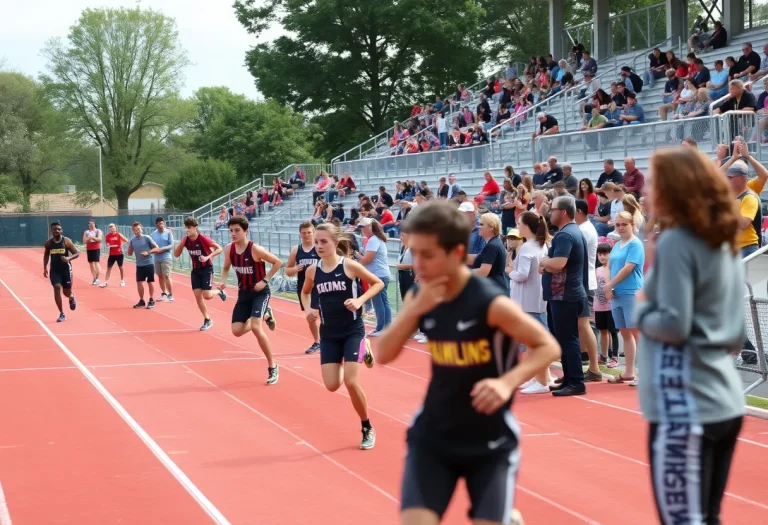News Summary
The Class B Indoor Track and Field State Championship in Maine has ignited a national debate on transgender athletes’ participation in women’s sports. Athletes, parents, and politicians are expressing strong opinions on the fairness of allowing transgender competitors in events designated for women. The discussion intensified following public comments from a local representative and the involvement of national figures, highlighting the complex intersection of sports, politics, and civil rights. As supporters rally for inclusiveness, Maine stands at a pivotal moment addressing these contentious issues.
Maine High School Track Championship Fizzes with Controversy over Transgender Athletes
Track and Field Meets Unveil Heated Discussions
In the beautiful state of Maine, a high school track and field championship has sent shockwaves not just through local communities, but right across the nation. The Class B Indoor Track and Field State Championship has become a focal point for a larger debate on the participation of transgender athletes in women’s sports. Tensions have been mounting as athletes, parents, and politicians weigh in on the issue, leading to a true national spotlight on the matter.
Zoe Hutchins Raises Concerns
Amongst the heated conversations is Zoe Hutchins, a senior at Lawrence High School. After witnessing her teammate compete against a transgender athlete, she expressed concerns about the fairness of the competition, igniting dialogues that many are now having. Hutchins’ feelings echo a broader sentiment among athletes who question whether it’s equitable for transgender competitors to compete in events designated for women.
Facebook Fallout Sparks Wider Debate
The situation took a turn when Republican State Representative Laurel Libby shared the results of a pole-vaulting event on her Facebook page. In her post, she highlighted that the winner—a transgender student—had previously competed in the men’s division. Representative Libby argued that the presence of transgender athletes in female competitions puts the fairness of the athletic events in jeopardy. This statement quickly gained traction and set the stage for more robust discussions about gender identity in sports events.
Political Ripples and Federal Forces
Things got even more intense when President Donald Trump waded into the debate. He threatened to potentially cut off federal funding to Maine if the state continues to allow transgender athletes in girls’ and women’s sports—ramping up the stakes significantly. In response, Maine Governor Janet Mills stood her ground, affirming that the state will uphold both current state and federal laws. Her willingness to possibly take this matter to court indicates a significant willingness to fight for what many in Maine believe is a right for transgender athletes.
Community Responses and Financial Fears
Despite the positions taken by lawmakers, a poll revealed that more than half of Maine residents oppose allowing transgender athletes to compete on teams that match their gender identity. This divide showcases how deeply this subject resonates within communities. Concerns were raised by Libby regarding the financial implications; a potential loss of federal funding could lead to significant budget cuts in schools across the state.
Supporters of the athletes have come together, particularly at Greely High School, positioning themselves in solidarity with the LGBTQIA+ community. This support demonstrates a burgeoning cabinet of active allies who stand for inclusiveness, even amid a politically charged atmosphere.
Legal Implications and Broader Civil Rights Discussions
This growing debate points to broader issues regarding civil rights and the role of the law in education and sports. The implications of this discussion stretch into potential legal battles, as both Maine’s Governor Mills and Attorney General Aaron Frey prepare to defend the state’s commitment to protecting transgender athletes against pressures from the federal government. Experts suggest that the stakes are immense, with state compliance to federal regulations in play.
Finally, this controversy has opened a wide-ranging conversation about the integrity of sports, competition, and the ethical responsibilities that come with Title IX protections. The dialogue may not be ending anytime soon, as concerns over fairness in sports and the rights of all athletes continue to rise to the forefront of community discussions.
Conclusion
As the high school track championship saga unfolds, it is essential for conversations to remain civil and inclusive. Though opinions may differ, the focus should always be on ensuring that every athlete, regardless of their background, has a fair chance to compete and thrive. Maine finds itself at the heart of a pivotal moment in sports history, and how it navigates this challenge may redefine the future of athletics in the decades to come.
Deeper Dive: News & Info About This Topic
LIVE BALL Resources
Changes to High School Track and Field Rules for 2026 Season
Oregon High School Athletes Challenge Transgender Sports Participation
Lewiston’s Ryker Paradis Wins Gatorade Maine Boys Track Athlete Honor
Girls Flag Football in New Jersey Makes Historic Progress
CIF Southern Section Announces All-CIF Selections for 2025 Baseball Season
Guilderland and Schuylerville Win Long Jump Titles
Local Athletes Shine at New York State Track Championships
Hispanic Student-Athlete Alleges Discrimination in Idaho
Pipestone Celebrates Golfachievements and New Shooting Facilities
Easton High School Claims District 11 Class 6A Softball Championship
Additional Resources
- NBC News: Maine High School Trump Transgender Student Athletes
- Wikipedia: Transgender Rights in the United States
- WGME: Transgender Athlete Controversy in Maine Sparks National Debate
- Google Search: Maine Transgender Athlete Controversy
- The Maine Wire: Maine High School Track Coach Trans Girls are Girls
- Google Scholar: Transgender Athletes in Sports
- 92.9 The Ticket: 2025 Boys Class A State Track and Field Meet Results
- Encyclopedia Britannica: Athletic Competition
- Central Maine: Varsity Maine Boys Outdoor Track Athlete of the Year
- Google News: Maine High School Sports News


